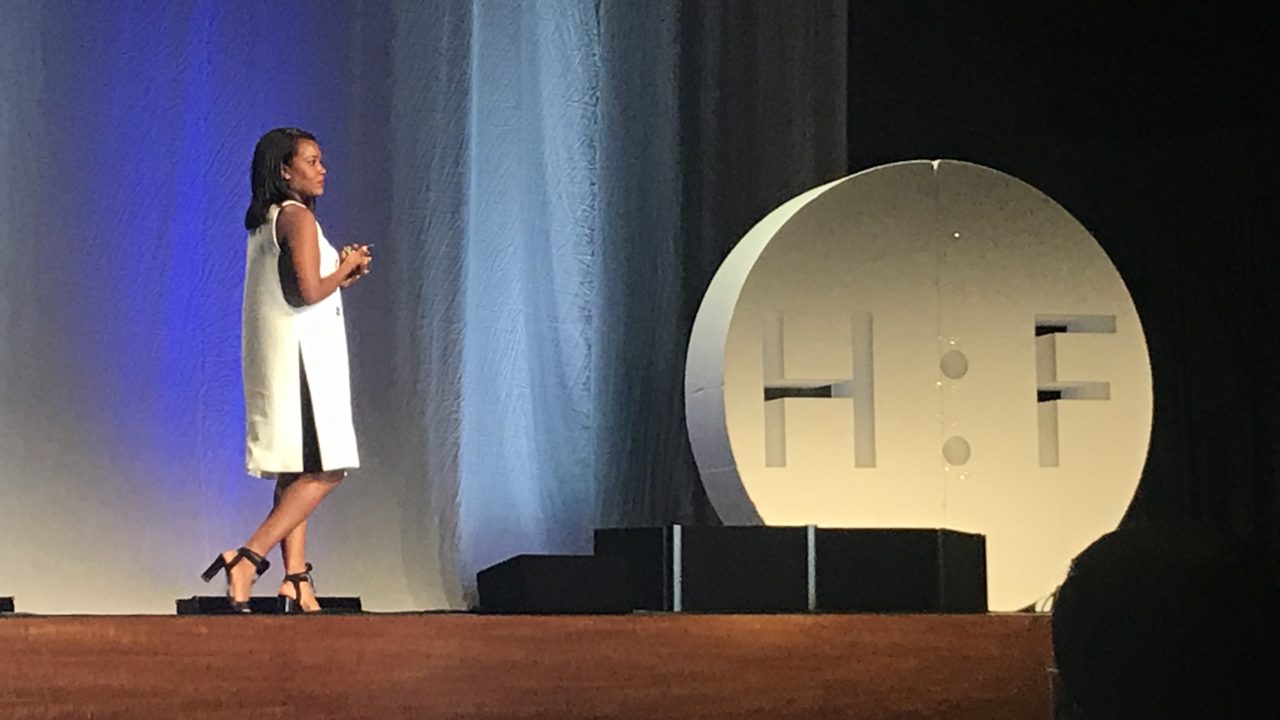By Kara Sherrer
Wednesday was the first full day of the regular Health:Further conference, no premium ticket required. The slate was jam-packed, with speakers from companies big and small, a pitch competition, and more.
Theme(s) of the day
Day 2 focused on the future of health care, looking forward to innovations, disruptions, as well as barriers to change. Speakers represented a variety of companies, from cutting-edge startups to bigger corporations that are still trying to stay ahead. In keeping with the theme of innovation, a pitch competition ran alongside the regular conference sessions from 9 a.m. to 2 p.m. Eighteen entrepreneurs got the chance to pitch their ideas to a panel of business experts; the winner will be announced Thursday afternoon.
Power players
Presenters from several large companies, including Samsung, Adobe, Salesforce, and DXC Technology (formerly Hewlett Packard Enterprise), spoke throughout the day. As he did on Day 1, CrossFit founder Greg Glassman offered up several colorful opinions on health — “Fitness is ****ed up because medicine is ****ed up” — and claimed that the medical community suppresses important information because it overvalues consensus and peer-reviewed studies.
Alencia Johnson, Director of Constituency Communications for Planned Parenthood, reviewed the many challenges faced by her organization’s clinics in the current political climate; while “no one comes to Planned Parenthood to make a political statement,” for many women, receiving much-needed health care has become a political act, even if they don’t want it to be.
Seema Verma, Administrator of the Centers for Medicare and Medicaid Services, discussed the problems facing her two programs and plans for overcoming them. Even though she oversees a federal agency, she emphasized the need to give states flexibility to provide more health care, since “our best ideas…come from local communities.”
Key takeaways
Yesterday afternoon may have been billed as the “Consumer Summit,” but today, speaker after speaker emphasized the idea that patients need to be treated with the same care and attention that consumers in other industries receive. The day closed with a talk from customer service expert Frank Eliason, who summarized the consumer treatment issue smartly: “You know health care has a problem when the person who worked at Comcast and Citibank is here talking to you about customer experience.”
However, as Thomas Swanson from Adobe pointed out, even as patients become more involved in their health care processes through apps and websites, some will undoubtedly choose to opt out of sharing their personal health information, creating consumer barriers to innovation.
The Vanderbilt Connection
The day started off with concurrent presentations from two Vanderbilt-affiliated speakers. Tatum Allsep (BS’97) gave a solo talk about the lack of viable health insurance options for musicians, while Paul Harris, Professor of Biomedical Informatics, participated in a panel about artificial intelligence and data science. Later in the afternoon, founder and CIO of Concert Genetics Mark Harris (BS’03, PhD’09, and MBA’11) spoke about precision medicine. “The goal of precision medicine is to maximize treatment benefit for all patients,” he said, before explaining the concrete steps that health care companies can take to leverage data to create precision medicine.
Can’t get over it
In Music City, one of the biggest health care capitals in the nation, “the deadliest preexisting condition that exists in Music City USA is being a poor, uninsured musician.” Tatum Allsep made this provocative claim in her early morning solo talk, and then explained her rationale: musicians are either self-employed or part of a small business and don’t receive insurance from an employer, leaving them to fend for themselves in the wildly expensive individual market.
Many musicians cannot afford insurance or the health care costs that come when they do fall sick. Allsep felt this pain herself when she gave birth to premature twins; she was self-employed at the time and left the hospital with half a million dollars in medical bills because of her poor insurance. This experience inspired her to become the founder and CEO of the Music Health Alliance, a resource for health care solutions and access for music professionals.
